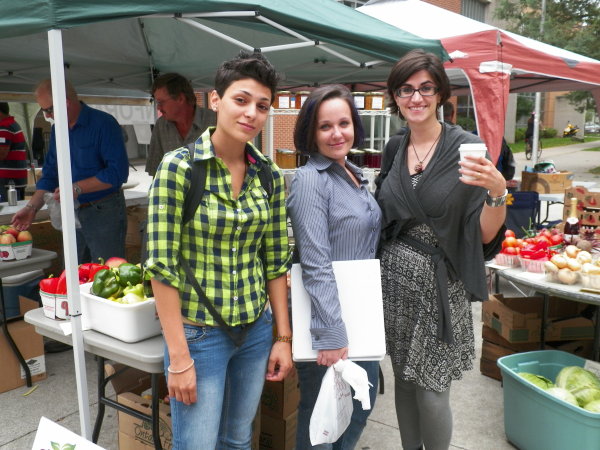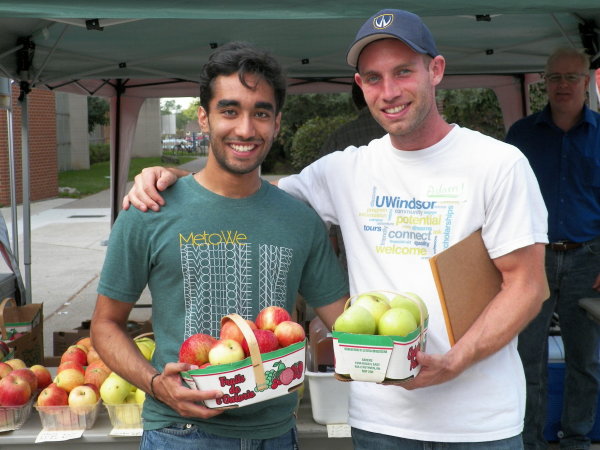The University of Windsor Farmers’ Market is the newest addition to a growing local food movement in Windsor, which counts 13 community gardens and five farmers’ markets in the area. Open September 26 to October 17 on Thursdays from 1 – 6 p.m., the market is run by volunteer students in collaboration with the University of Windsor Students’ Alliance. It is located outside between the university student cafeteria’s glass walls and a charming configuration of brightly painted metal picnic tables.
Students and residents in the west end neighbourhood have few options to access fresh fruit and vegetables, especially those without a car. Students have the additional challenges of little time for shopping and tight budgets. The market is playing a role in addressing these concerns.
Osman Raza, the market’s operational manager, is in charge of logistics and ensuring regulation compliance. The biochemistry and political science student took the initiative in bringing this idea to fruition by working with the Downtown Windsor Farmers’ Market and connecting with Steve Green, the general manager, and Adam Wright, the site manager.
Adam Wright, a fellow student, is the general manager, and works with the market’s 14 vendors. He has also spent the past few years volunteering at the University of Windsor Campus Community Garden. Although produce from the garden is not being sold at the market, it is easy to find links between the two. Some of the current 20 volunteers for the market are also garden volunteers. Tours of the garden originating from the market are planned, and heirloom seeds harvested from the garden were offered to customers.
Wright felt that having a farmers’ market at the University of Windsor was a much-needed service as students are “tuning in to healthy food and breaking out of the stereotype of fast food and mac and cheese, every day and every night.” Farmers are stewards of the land, he added, and buying local helps to improve our health and the environment’s health.
According to Wright, the University of Windsor’s Farmers’ Market “is more than just a place to do shopping. It is a social event where you can meet professors, students and members of the community.” He points out the benefits of interacting with the farmers, who can share information about gardening methods, describe how their produce was grown, and recommend recipes.
At the latest market on October 3, steady streams of students formed line-ups at the stalls. Faculty members were also out, as well as community members who came to check out Windsor’s newest market.
In addition to a wide variety of locally produced fruits and vegetables, including 10 kinds of apples, there was responsibly produced coffee, First Nations handiwork, maple syrup, baked goods, kettle corn, soaps, spice mixes, fish, pickles and jams on offer. Live entertainment was also provided.

Photo: Catherine Owen
Vendors remarked how supportive the students have been. Bob Arquette of Mimi’s Vegetables stated how much he liked the people: “They are really friendly. They are always thanking you.” He is a vendor at a number of farmers’ markets, and has seen a steady increase in business. The increased business helps his fellow farmers too, as he often has to rely on others to provide some of the produce for his stall.
Student Sarah Ling says she loves the new market. “Last year, I could only get apples for a dollar each. Now we have a variety of vegetables and fruits, and they are affordable,” she notes. A fellow student, Sophia Mongomery, raved about the quality of the coffee, and was pleased to report that it was obvious that pesticides weren’t used because there were ladybugs in her lettuce.
The University of Windsor’s Farmers’ Market strives to be a centre for community-building. The strike on campus by Local 1393 CUPE workers was addressed in this light. Adam Wright contacted the local’s office, and gained their support. Pickets were withdrawn from an inroad to allow vendors to drive in and set up. To show their appreciation, the market provided striking workers with fresh fruit and baked goods.
Farmers’ markets are an essential component in the local food movement and this latest market, along with a growing interest in local, sustainable food, is evidence the movement is expanding.
Catherine Owen regularly contributes articles on environmental and sustainability issues to the Windsor monthly alternative paper, the Scoop. She recently retired from Canada Post.



